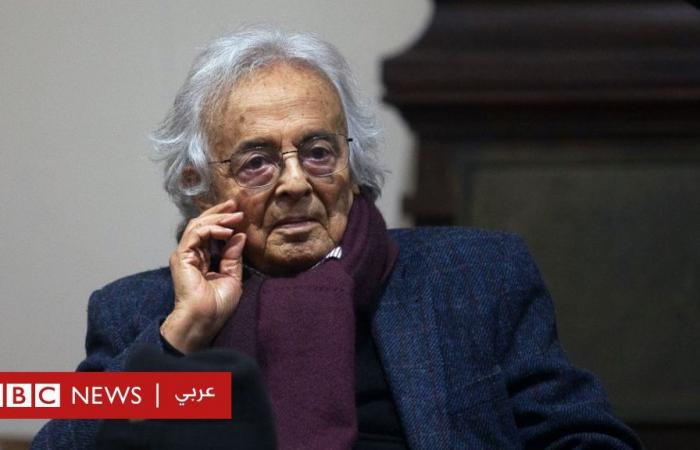- Anwar Al-Ansi
- BBC – London
March 22, 2023, 07:02 GMT
image copyright GettyImages
There was an event that Saudi Arabia witnessed last week, the passage of which, in the view of many, would not have been normal or fleeting, given its implications and what it aims at.
Saudi Arabia’s invitation to Adonis, the controversial thinker and poet, was not alone a cultural event in the context of what its new young leadership is trying to do to change its image radically and differently from its past, which was always subject to severe criticism by the Syrian thinker residing in the West, but what the press described Saudi Arabia itself that it is an (extensive qualitative presence) of the educated and educated Saudi elite in the vast halls in which Adonis gave two lectures and a poetry evening in a number of cities in the Kingdom, which gives this event a special importance.
Officially, Saudi Arabia dealt with Adonis’s visit with clear calmness, in a way that did not deviate from its cultural character, leaving the interactions of its educated elites with Adonis’s presence to take its toll in his meetings with those elites without excessive media coverage of this event.
But behind that calmness there was an interest, or even a measure of undeclared satisfaction, for the presence of this (problematic) thinker in the capital of the (religious state), which he had always criticized in the past in the most daring terms, considering that it was living in a break with the times.
More than that, it was remarkable that the welcome that Adonis received on social media by the audience of intellectuals, educated people, and young people without reservation in expressing joy in their country hosting this secular intellectual famous for his intellectual troubles.
On his Twitter account, the Saudi writer, Awad Shaher, said, “Here, one of the most important and prominent Arab intellectuals in this era discovers for himself the extent to which our cultural movement has become broader assimilation and the highest flexibility in creating a scene worthy of our country, our Arab culture, and our historical dimension.”
This is while another Saudi writer, Saeed Al-Surayhi, welcomed Adonis in a tweet, saying, “When we place Adonis’s visit, a poet and researcher, to the Kingdom in the context of our openness to the world, an openness supported by our self-confidence and reinforced by our desire for dialogue and based on recognizing the other’s right to difference, When we put Adonis’ visit in this context, we realize the important symbolic dimension of this visit.
As for outside Saudi Arabia, there were questions about the implications of this event in its timing, circumstances, and the contexts in which it could be included.
On the Syrian level, Syrian opponents refused to consider this visit as part of a public relations campaign undertaken by Riyadh to improve its image. Others ruled out that it has anything to do with the ongoing normalization efforts between Saudi Arabia and Syria, the country of origin of Adonis and its close ally, Iran.
The Syrian dissident Fayez Sarah said in an interview with the BBC that as far as “there may be things that serve Saudi Arabia from this visit, it is also certain that there are things that Adonis saw that it would serve him to do it.”
That is why, according to Sarah, “a great intellectual like Adonis cannot be an agent serving Saudi goals.”
On the other hand, the Syrian writer Ibrahim al-Jabin did not see a valuable indication of Adonis’ visit, saying in statements to the BBC, “Adonis with time and his consumption of himself became a subject of constant controversy to the extent that he liked it, and he does the thing and its opposite at the same time.” And what al-Jabin sees is that what Adonis is doing is that he “goes to the place that attacked him throughout his life in his poetry, dialogues, and books, and goes to the culture that he despises, and which he said about it offered nothing but violence, blood, killing, and beheading.”
As for Adonis himself, he seemed to anticipate all the reactions to his visit by expressing his satisfaction with this tour in Saudi Arabia, where he said in a video recording posted on Twitter and in a number of Gulf media upon his arrival in Riyadh, “I am so happy that I do not know how to describe this happiness”.
Saudi news websites also quoted him praising what he described as “the literary and cultural heritage of Saudi Arabia, which places it first in poetry” and that he sees in the desert “his deep Arab extension, with its enormous energy of legacy and secrets.”
This is while other sites, including some Syrian opposition platforms, reiterated his previous criticisms of Saudi Arabia and other Gulf countries and their role during what was known as the Arab Spring revolutions.
However, there is an almost general impression that Saudi Arabia would not have become a destination for dozens of thinkers, poets and artists, the latest of which is Adonis, had it not been for Saudi Arabia today experiencing a new climate after a young leader who came from the back rows of its former elderly leaders came from that broad sector of youth looking forward to his chance for change. And expressing his enthusiasm to reset the compass of their country in the right direction of the movement of history.


